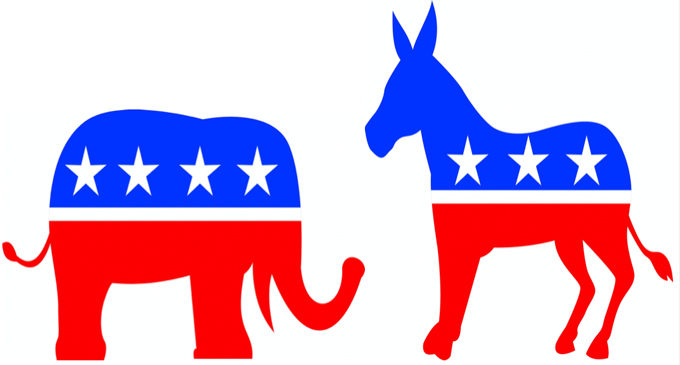Commentary: Two parties. Two countries.

By Tom H. Hastings
We have a two-party political system, one that evolves with time, people, and circumstance.
Democrats were, for many years, a party that fought against civil rights for African Americans where they were denied them in the American South under the racist Jim Crow system. When I was a boy, back in the 1950s and ‘60s, the Democrats from the South were known as Dixiecrats. Frankly, I never understood the basis for those bizarre alliances between northern Democrats like Hubert Humphrey, known for his vigorous advocacy for civil rights in his home state and town, Minneapolis, Minnesota, as well as the country, and southern Democrats like John Stennis or James Eastland, both ardent opponents of civil rights for African Americans.
Then, of course, came Nixon’s 1968 presidential campaign’s Southern Strategy, actually first attempted in 1964 by Barry Goldwater. This slowly converted white Southerners who were against civil rights for all, against women’s equal rights, against a federal role in most things, and in favor of politicizing and furthering the agenda white evangelicals. Southern Democrats, aka Dixiecrats, chose more and more to become Republicans.
Now, in light of the voter suppression, gerrymandering, and partisan control over the erstwhile nonpartisan election officiating, Republicans are increasingly a party identified as anti-democracy, pro-autocracy. This is the logical conclusion of this long process, one that in truth resulted in the American Civil War more than 150 years ago.
Arguably, the greatest mistake ever made by any president was Lincoln’s decision to go to war rather than allow the Confederacy to simply secede. Through many available measures, the Confederacy, if it were its own sovereign nation-state, could have far more peacefully been convinced to abolish slavery on its own. How?
*The world could have been convinced to refrain from purchasing any products from the American South and refrain from selling them any. This sort of practice was part of the successful British abolitionist movement that economically pressured its own government to outlaw slavery. It is widely acknowledged that slavery was not nearly as profitable as exploitation of wage workers in the rapidly industrializing nations.
*Various parties—the federal government, state governments in the North, civil society organizations devoted to abolition (there were many), or even wealthy individuals—could have engaged in what was known as compensated emancipation, that is, basically buying slaves and freeing them. This is part of how the entire British empire ended slavery across its world without firing a shot. Lincoln himself supported it but it did not enter into pre-Civil War law.
In my field of conflict transformation, one of the things we study is the lingering effects of a conflict. How that conflict was resolved is key. If it’s done peacefully, very little legacy of resentment persists. If it’s done destructively, there is often a burning desire for revenge, often handed down inside the defeated tribe, nation, or people. It is the collective version of the passive aggressive individual problem with being harmed and humiliated.
This is the core, now, of the Republican Party, which more accurately could now be called the Autocracy Party or the Anti-Democracy Party. Can we heal this? I believe so, given honest effort and compassion, two qualities crucial for our future as a country, and as a free people. It will require digging deeply into our spirit of forgiveness and trauma-informed empathy and digging out of the all-too-human wish for payback and retaliation.
Good luck to us.
Dr. Tom H. Hastings is coördinator of conflict resolution BA/BS degree programs and certificates at Portland State University, PeaceVoice senior editor, and on occasion an expert witness for the defense of civil resisters in court.









